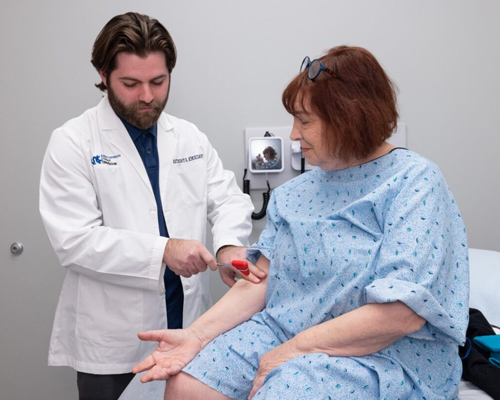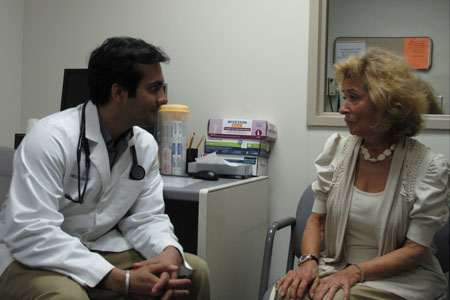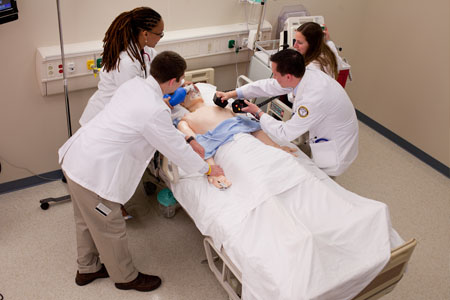Innovative Medical Technology
Learning at the College of Medicine extends far beyond the classroom. Along with clinical rotations in hospitals, students get hands-on experience in our "living laboratory," which has some of the latest, most advanced facilities in health care for the purpose of teaching basic sciences and clinical skills.

Clinical Education and Assessment Centers (CEACs)
Clinical Education and Assessment Centers, located at the University City and West Reading campuses, have examination rooms that look like physicians' offices and are linked to control and observation rooms. Students work with standardized patients, trained actors who portray medical scenarios, to enhance abilities in medical interviewing, physical examination and patient counseling.
Digital videos of the students taking histories, educating patients and performing physical examinations are captured and archived for review by faculty and students. More about our standardized patients can be found on our Standardized Patient Program website.
Learn more about the CEACs
Medical Simulation Centers
The College of Medicine’s simulation centers have patient rooms and operating rooms that are equipped with functioning beds, gas rails and sinks, and are configured to simulate patient care in the hospital setting. Instead of actual patients, each simulation room contains life-like computer-controlled robotic manikins with palpable pulses and audible heart and lung sounds. The manikins breathe and blink, respond to injected drugs, can be intubated and defibrillated, and much more. The "patient" can even "speak." All functions are managed by a technician in a nearby control room. Encounters are recorded on digital video for students and faculty to review in post-encounter sessions. Task-training rooms also house individual stations such as venipuncture, suturing or birthing simulation training.
Learn more about the Simulation Centers

Health Care Communication and Professional Formation
These unique resources, which were developed by Drexel faculty and are used by medical schools around the United States and worldwide, teach students to improve communication skills and develop as professionals through web-based video encounters between physicians and patients. The modules provide users with knowledge, skills review and opportunities for reflection, and foster learning about complex communication and relationship challenges.
Learn more about Health Care Communication and Professional Formation
Clinical Skills Portal
Physical exam skills, diagnostic reasoning, modules on symptoms and signs, clinical procedures and other resources are available in the College of Medicine’s online clinical skills portal. Medical students have exclusive access to these resources to develop the skills necessary for becoming physicians in the 21st century.
Gross Anatomy Labs
Gross Anatomy Labs, located at the University City and West Reading campuses, are outfitted with high-definition monitors and mini computers that have several useful software packages installed. From the labs, students have access to internet resources and can download the dissection instructions to the lab computers as well as to their personal laptops and iPads. High-definition video cameras are in place at the instructor's station in the labs and the faculty can review dissection material and radiographs with the entire class using this technology.
Health Sciences Library
Students, faculty and staff from the College of Medicine have access to the Libraries’ online resources, guides and tutorials, and interlibrary loan and course reserves services.
Librarians on the Health Sciences team provide services to support the research and teaching needs of faculty, staff, and students working in health professions, medicine, nursing, psychology, and public health. Relevant physical materials including course reserves materials, are available in the W. W. Hagerty Library in University City. For more information on borrowing and course reserves, visit the Libraries website.

Multidisciplinary Laboratories
The laboratories have tables with microscopes for teaching neuroanatomy, microbiology and pathology. Microscopes are equipped with a video camera so all students can look at a single slide under the microscope through monitors or on a projection screen.
Multimedia Technology
Students can augment the information and skills they learn from classes, print materials and clinical rotations. For example, computer simulations of the autonomic nervous system provide a graphic model for experimentation in the pharmacology laboratory.
Virtual Microscope
With the Virtual Microscope, students can access digitized slide collections in histology and pathology anywhere and anytime.
Wireless Internet Access
Students can access the Internet from anywhere on our campuses; we require all entering students to own an iPad and a computer (either a desktop or laptop).
Contact Information
Drexel University College of Medicine
Office of Admissions
60 N. 36th Street, Philadelphia, PA 19104
215.991.8202
Back to Top